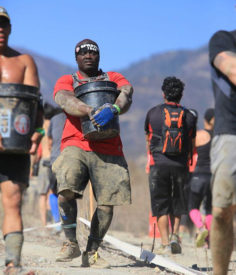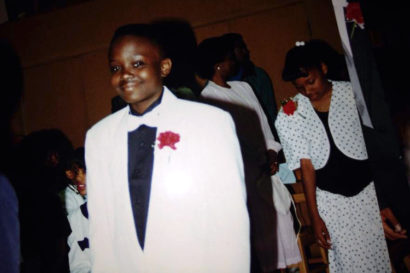Podcast: Berkeley Haas Chief of Staff Marco Lindsey lives like his 80-year-old self is watching
The East Oakland native is committed to being a mentor to as many young people as he can — paying forward the support he got when he was growing up
December 11, 2018
Every morning, Marco Lindsey wakes up in East Oakland, where he was born and raised. He puts on a suit and tie, packs his briefcase, chats with his neighbors and drives to work at Berkeley Haas. It’s a typical morning routine, but to Marco, it’s a lot more than that. It’s a way to show boys and young men in his community that they have possibilities. He didn’t have that growing up. But his drive — and mentors who helped steer him — propelled him forward, and now he’s helping others to succeed. His motto: Live your life as if your 80-year-old self is guiding you.

Marco Lindsey is the chief of staff to the dean at Berkeley Haas. (UC Berkeley photo by Brittany Hosea-Small)
Following is written version of Fiat Vox podcast episode #46: “Berkeley Haas Chief of Staff Marco Lindsey lives like his 80-year-old self is watching:”
Every morning, Marco Lindsey wakes up in his East Oakland neighborhood — where he was born and raised. He puts on a suit and tie, packs his briefcase, chats with his neighbors and drives to work.
[Music: “Night Owl” by Blue Dot Sessions]
It might seem like a typical routine, but to Marco, it’s a lot more than that. It’s a way to show boys and young men in his community that they have possibilities — that who they can become and what they can achieve is much bigger than they might know.
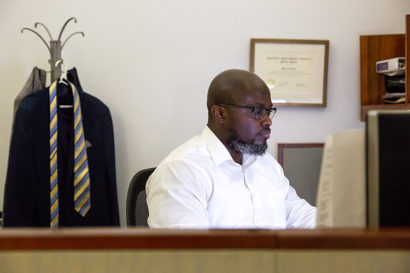
Every morning, Marco leaves his house wearing a suit and tie. It’s a way to show boys and young men in his community that what they can achieve is much bigger than they might know. (UC Berkeley photo by Brittany Hosea-Small)
“I’ll just say that when I was growing up, I never saw a lot of positive black male role models in the neighborhood,” says Marco. “There were a lot of blue-collar working-class people and, you know, that was great. But I never saw a doctor. I never saw an engineer. I never saw a black lawyer or anything like that.
“So, it kind of limited my thinking in regards to what I could aspire to be when I grew up. I just never saw it. And so, I never even thought to consider it.”
Marco has been the chief of staff to the dean at UC Berkeley’s Haas School of Business for five years. He’s worked at Berkeley for 11. And I think it’s safe to say that he’s a really driven person. He knows what it means to work hard.
As an example, Marco does these races called Spartan Races. They’re kind of like a hybrid of a triathlon and a hardcore CrossFit workout. He’s done eight of them so far.
“It’s almost all uphill running,” he says. “You’re crawling under barbed wire uphill. You’re scaling walls. It’s a lot of wall climbing. It’s a lot of climbing up ropes and climbing down ropes, monkey bars. It’s all these things, and basically the Spartan Race is designed to find your weakness and exploit it.”
[Music: “Begrudge” by Blue Dot Sessions]
There was one race that Marco did in Tahoe in 2015 where it started to snow. One of the obstacles was swimming across part of the freezing cold lake. People were dropping like flies — several hundred people were carted off the racetrack with hypothermia. But Marco didn’t stop.
“I just pretty much made my mind, like, ‘Hey, I have to die. Like, this is it,'” he says. “‘I’m going to keep going. You know, if I have the energy to keep going, I’m just not going to stop. Like, unless I’m passed out, I’m gonna keep going.’ And eventually I made it to the finish line.”
“It was really a testament to how much brain power that we have and how much we can just will ourselves to accomplish our goals as long as we don’t give up. And as long as we just make that decision to not give up, I think that there’s no limit to what we can accomplish.”
In 2016, Marco organized a panel discussion to connect people of color from the campus and community to tech jobs in the Bay Area. He talked to recruiters from tech companies, like Slack, Google and Facebook, who agreed to be a part of the panel. And he got 400 people to attend, some of whom got jobs at these companies.
But, the next year, he wanted to do even better. So, he put together a series of three panels for people of color to learn how to create jobs and create their own tech companies. In the past two years, his panels have reached nearly 3,000 people in the Bay Area.

For the past two years, Marco has been an adviser to the Collegiate 100 at UC Berkeley, an organization that extends the mission of the 100 Black Men of the Bay Area to support the development of young black college students. (UC Berkeley photo by Brittany Hosea-Small)
“I realized that there are people here who have the aptitude, they have the ability, they have the capability, they have the thought process, they have all these things,” says Marco. “They just don’t have access or information about it, right? And so a huge part of what I do is to help the people who are here get the jobs that are coming here and help them stay in their communities and be able to afford to live in their communities.”
At Berkeley, Marco is an adviser to the Collegiate 100. It’s an organization on campus that extends the 100 Black Men of America’s mission to support the development of young black college students.
Marco and another mentor, Phillip Barnett, who actually started the Collegiate 100 as a student in 2006, meet with the group every Tuesday evening.

Marco says because he had solid mentors growing up, he feels it’s his responsibility to pay it forward to future generations. (UC Berkeley photo by Brittany Hosea-Small)
“We provide support to them, whether that’s help with finding employment, help in finding internships, conversations about being a man, what does that mean,” says Marco.
Marco sees being a mentor as his responsibility. He says he knows he wouldn’t be where he is today without the support and guidance that he received from people along the way.
“And so, it’s about paying it forward. You know, so that way the next generation, you guys can be successful.”
[Music: “Algea Trio” by Blue Dot Sessions]
Marco grew up the youngest of six kids. By the time he was in elementary school, most of his brothers and sisters were already out of the house. But he had this huge extended family — his grandmother had 13 kids and her brother had 19 kids, so Marco had a lot of cousins his same age living in the Bay Area. And he had a lot of mentors he learned from — his uncles and his brother-in-law, Antoine, who gave Marco some advice when he was a teenager.
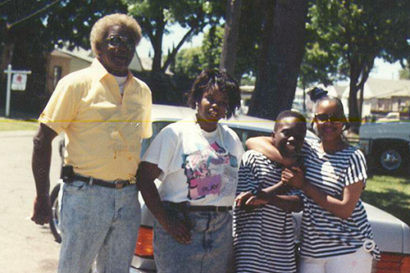
Marco with his dad, Caleb, and two of his older sisters, Veronica (left) and Rolanda (Photo courtesy of Marco Lindsey)
“So, what he told me was that, ‘If you want to be a screw up, you want to be a knucklehead, you want to, you know, do whatever it is that you want with your life. That’s totally fine. But make sure you get an education first because if you get an education, you can choose to be a screw up or you can choose to be successful. If you don’t get an education, you don’t have a choice.'”
When Marco was 19, his older brother was walking down the street in Oakland and was shot in the back of the head and killed.
It suddenly hit Marco that it was his responsibility to do better. For his mother, who was devastated by the loss of her son. And for himself and all the role models who had helped guide him.
“I think that my brother didn’t necessarily have a lot of the role models and things in his life that I had, you know, because of the age difference,” he says.
“And so, I think that I had more knowledge, people sowed more into me and I just felt like there was responsibility that came with that. Like, ‘Hey, if you can do better, you should do better.'”
[Music: “PolyCoat” by Blue Dot Sessions]
At Berkeley Haas, Marco is committed to helping support the future business leaders of the world, students who will be making decisions that will affect generations to come.
“I feel comfortable in knowing that these business leaders that we’re creating, they’re going to be ethical, they’re going to be taught the right things, and we’re going to talk to them about social responsibility and thinking outside of themselves and not just bottom lines but, you know, people-focused. That’s important to me. And so, it’s this broader societal focus that I have access to here and that’s one of the things that keeps me here and keeps me motivated.”
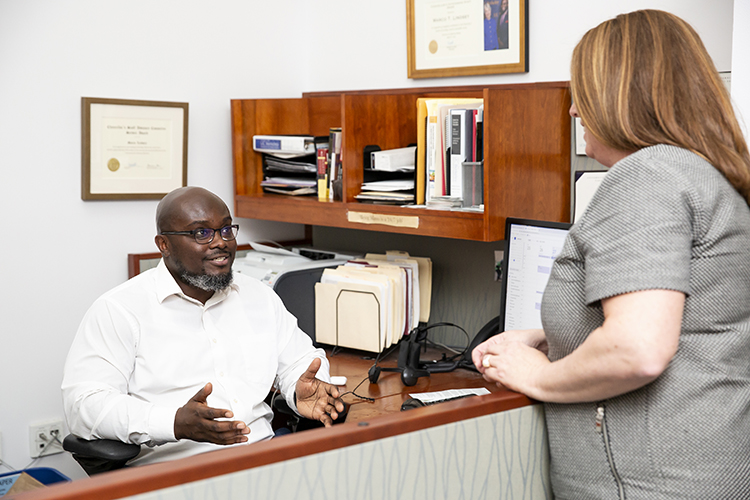
Marco talks with Courtney Chandler, the senior assistant dean of Berkeley Haas. (UC Berkeley photo by Brittany Hosea-Small)
“I have two life mottos. One is: If you help as many other people become successful as you can, you can’t help but be successful yourself. The second motto is: Live your life as if you’re 80 years old and you got to look back on today and give yourself feedback. Live your life as if 80-year-old you were guiding you now.
“What do you think 80-year-old you will want you to do? I think that we all look back and say, ‘Oh, if I was 20 again, I would do this differently.’ Whatever the case may be, we all can have this great hindsight. But, you know, I say this, have some foresight with your hindsight. Are you doing the things that you wish that you were doing on your deathbed?” Because if you’re not, pivot — you need to do something differently.”

“If your light isn’t shining, then what use is it?” asks Marco. (UC Berkeley photo by Brittany Hosea-Small)
And that’s how Marco tries to live every day — trying to remember the meaning behind what he does and to put himself out there, so others can see how he chooses to live.
“You can be living it, but if no one sees it, it really doesn’t help, right? It’s like, if your light isn’t shining, then what use is it?”
He says that part of what success means to him is feeling comfortable with who you are and confident that you bring something to the table — that your expertise matters.
Last year, Marco received a member of the year award from the 100 Black Men of the Bay Area for his work in connecting Bay Area communities of color with opportunities with tech companies and fostering entrepreneurship. He also got special recognition from U.S. Rep. Barbara Lee and a Chancellor’s Outstanding Staff Award.
And I think it’s safe to say that he’s not done yet. He’ll keep going, keep paying it forward, for as long as he can.

